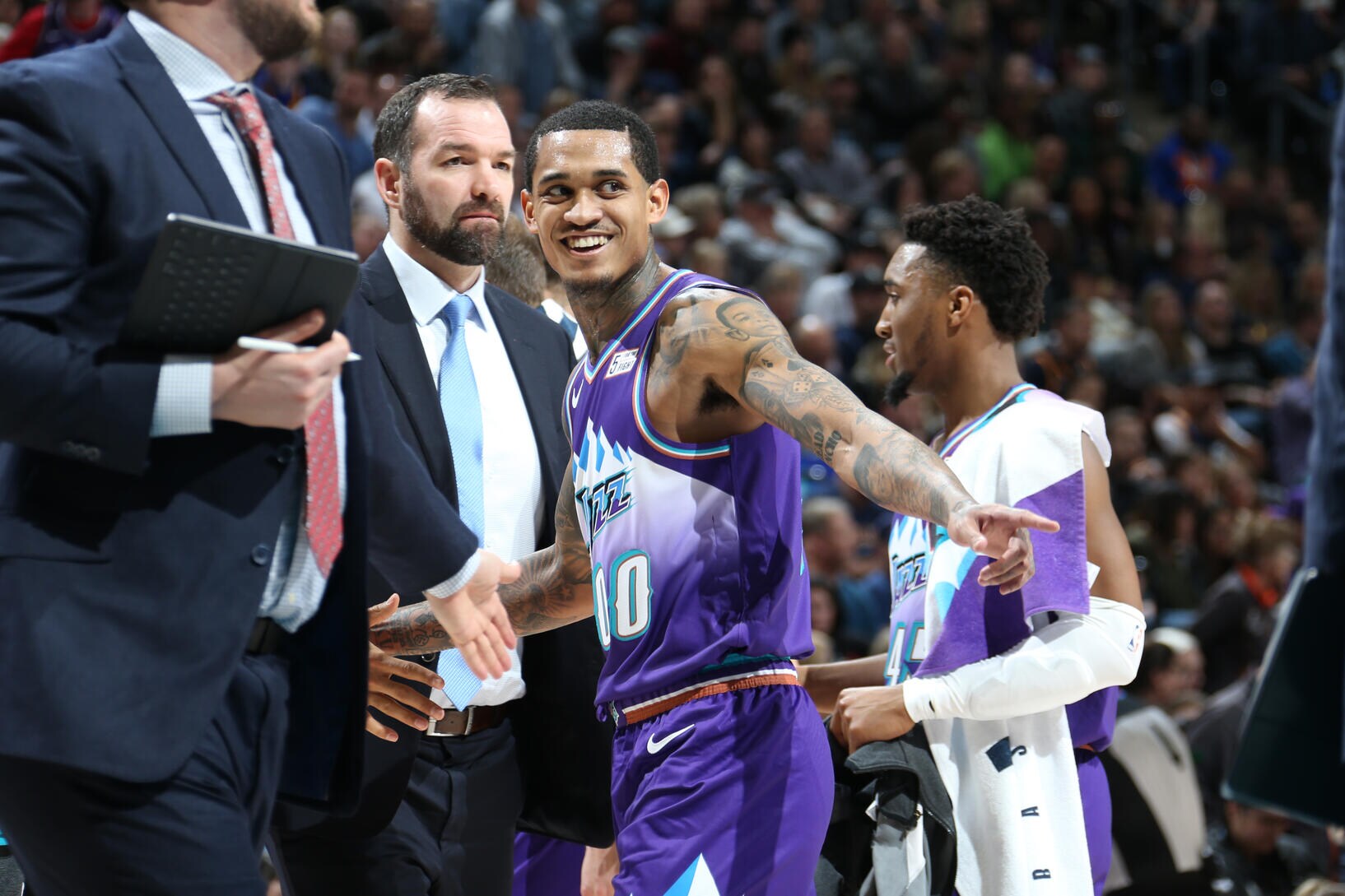When the Utah Jazz’s front-office decision-makers upgraded the team’s starting five, bringing in Mike Conley and Bojan Bogdanovic last summer, there was going to be a trade-off.
“We were very aware that the bench over the previous three years won us a lot of games,” says Dennis Lindsey, the team’s executive vice president of basketball operations. “The first bite of the apple to repopulate the bench to help us win games, especially during the regular season, was going to be a little bit more of a challenge.”
That challenge manifested themselves in different ways over the first 30 games of this NBA season. And that challenge was made more difficult when Danté Exum’s rehabilitation from knee injury took longer than anticipated, and even more difficult when Conley went down with a hamstring injury.
So this week, with the Jazz’s bench ranked 29th in scoring (26.9 points per game), Lindsey, general manager Justin Zanik and the rest of the Jazz front office decided it was time to make a change.
“It’s an incomplete evaluation,” Zanik said. “But it still doesn’t change the fact that the bench needed to up the production and we needed to see if there were other avenues to address that.”
So this week, the Jazz said goodbye to Exum, the No. 5 pick in the 2014 NBA Draft, trading him to Cleveland for guard Jordan Clarkson. Then the team waived veteran forward Jeff Green, clearing a roster spot to sign G League standout Rayjon Tucker.
On Thursday, Lindsey and Zanik offered some insights into the team's moves this week.
WHAT JORDAN CLARKSON BRINGS
The Jazz tracked Clarkson long before he was picked in the second round of the 2014 draft. Last summer, Jazz head coach Quin Snyder mentioned Clarkson’s name to Lindsey as a possible offseason target. With the Cavaliers rebuilding, looking to add cap space and assets, the guard was made available and the Jazz jumped on the opportunity.
Lindsey highlighted a few things they especially liked about Clarkson’s game:
• The 6-4 guard has always provided scoring for his teams. This season he was averaging 14.6 points while anchoring the Cavs’ second unit.
• He has been a low-turnover player. For his career, Clarkson has averaged 2.2 turnovers per 36 minutes.
• This season, Clarkson and Cleveland coach John Beilein have reengineered the guard’s shot distribution. As a result, Clarkson is enjoying a career-best 19.3 Player Efficiency Rating.
• He is durable. Clarkson has played in 79, 82, 81 and 81 games in his last four seasons respectively.
In addition to providing an offensive punch of the bench, the Jazz hope Clarkson’s arrival will help the team’s starters. Snyder has staggered his starters, playing them with bench units throughout the game to provide a scoring punch. With Donovan Mitchell averaging nearly 35 minutes per game and Bojan Bogdanovic averaging more than 33, the Jazz wanted to get their scorers some help.
“We needed to add someone who could go and get a shot,” Lindsey said. “We could tell Donovan was getting stretched. Bojan was getting stretched. Quin has done a good job of using the starters to help the bench along, but that got even more compromised with Mike’s hamstring injury.”
SOFT LANDINGS
The Jazz were conscious of the futures of both Exum and Green in their decisions this week.
“We wanted to give Danté a fresh start on a team where not every second because you’re in a playoff chase, is going to be evaluated,” Lindsey said. “This will give him a chance on a team that matches his timeline.”
As for Green, the Jazz could have potentially traded the veteran forward. Instead, they chose to waive him.
“Instead of moving Jeff to a club that was rebuilding, the honorable thing to do under the circumstances was to waive him, give him his freedom and now he can choose his situation,” Lindsey said.
WHO WILL TAKE GREEN’S MINUTES?
The Jazz have been pleased with the development of big men Juwan Morgan and Jarrell Brantley at the G League level. But you can expect Georges Niang to get the first shot at eating up some of the minutes available now at power forward.
“A lot of Georges’ minutes have been as a wing,” Lindsey said. “He’s versatile and smart and can play both in an emergency. But we’ve always viewed him more as a skilled, mobile 4 than a big 3.”
WHAT TO EXPECT FROM RAYJON TUCKER
The Jazz have always valued flexibility to add to the roster. That’s not an easy task when you’re fighting for playoff positioning. But with faith in their development staff, and an intriguing prospect on their radar, the Jazz went after 6-3 guard Rayjon Tucker.
Even before Tucker dropped 34 points against the Salt Lake City Stars in the G League’s Winter Showcase, he had caught the eye of the Jazz front office.
“There were several players this year we liked that weren’t even drafted that are now doing well in the G League, some are actually contributing to NBA clubs,” Lindsey said. “Rayjon was one of them.”
At the Showcase, the Jazz found themselves in a bidding war. Six teams were interested in Tucker’s services. But by Monday, it was between Utah and one other team. The Jazz offered Tucker a guaranteed deal for the rest of the season and got their man.
“Quin and the coaches were very helpful,” Lindsey said. “They liked him in his workout last summer. We had a lot of draft deliberation and debate, and he was one of the guys we were considering with all three of those picks. …
“He’s a little bit of a power guard-slash-wing. We love his body, his ability to score. There are lot of areas that he has to work on, but we feel confident in our development staff.”
